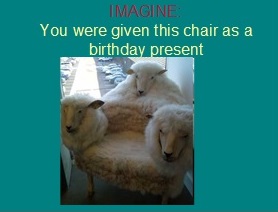Блог учителя англійської мови Литвинової В.А.
Drill Conditionals in a poem
- Деталі
- Перегляди: 10617
 Worksheet 1. Reading: If, a Poem
Worksheet 1. Reading: If, a Poem
Read the introduction to the poem and the poem itself by Rudyard Kipling (1865-1936). Then complete the exercises that follow it. A paraphrase of each verse follows the poem.
The poem If was written in 1910. It describes the virtues that Kipling believes are necessary to become a
mature man. (In those days, women were not included in such a description.) Kipling means the poem to be instructive. He doesn’t list abstract values about what it takes to be a full person. Instead he gives concrete examples of the situations that face human beings. In modern times, this poem is regarded as a popular classic of English literature.
1) If you can keep your head when all about you
Are losing theirs and blaming it on you,
If you can trust yourself when all men doubt you
But make allowance for their doubting too,
2) If you can wait and not be tired by waiting,
Or being lied about, don't deal in lies,
Or being hated, don't give way to hating,
And yet don't look too good, nor talk too wise:
3) If you can dream--and not make dreams your master,
If you can think--and not make thoughts your aim;
If you can meet with Triumph and Disaster
And treat those two impostors just the same;
4) If you can bear to hear the truth you've spoken
Twisted by knaves to make a trap for fools,
Or watch the things you gave your life to, broken,
And stoop and build 'em up with worn-out tools:
5) If you can make one heap of all your winnings
And risk it all on one turn of pitch-and-toss,
And lose, and start again at your beginnings
And never breathe a word about your loss;
Worksheet 1 (page 2)
6) If you can force your heart and nerve and sinew
To serve your turn long after they are gone,
And so hold on when there is nothing in you
Except the Will which says to them: "Hold on!"
7) If you can talk with crowds and keep your virtue,
Or walk with kings--nor lose the common touch,
8) If neither foes nor loving friends can hurt you;
If all men count with you, but none too much,
9) If you can fill the unforgiving minute
With sixty seconds' worth of distance run,
Yours is the Earth and everything that's in it,
And--which is more--you'll be a Man, my son!
Choose the correct phrases and form a Conditional sentence - type I or II. Mind the position of the if-clause and negations.
1) If we………….. to Dresden, it will be a fantastic trip.
2) I…………. the school bus if I don't get up early.
3) Harriet would stay longer in Vienna if she……………. more time.
4) She………. the people in Peru if she bought her coffee beans in this shop.
5) If I don't see Claire today, I………….. her this evening.
6) If Carlos…………. sailing, he'll need a life-jacket.
7) If my brother………….. his car here, the traffic warden would give him a ticket.
8) You'll catch a cold if you…………… a pullover.
9) If you drink more of this sweet lemonade, you………………. sick.
10) If Marcus sings under the shower, I…………….. the radio up to full volume.
Put in the verbs in brackets and form Conditional sentences - type I or type II. Mind the negations.
Example: If Adam spoke Italian, he ________ (to work) in Italy.
Answer: If Adam spoke Italian, he would work Italy.
1) If Tracy had a mobile phone, she…………….. (to phone) all her friends.
2) I …………(to be) very angry with Nick if he forgets my CD again.
3) If the boys …………..(to win) this match, their coach will invite them to a barbecue.
4) If you don't read these articles, you ………..(not/to know) the facts about Africa
5) You would get very wet if you …………(to walk) in this rain.
6) The engine……….. (not/to start) if Ben connected these two cables.
7) If he has time, he ……….. (to buy) her some sweets.
8) Maria ………. (to play) in the school orchestra if she practised the trumpet more often.
9) We won't fetch something to drink if Jim………. (not/to bring) some sandwiches.
10) If he……….. (to carry) the rucksack, I'd pull the suitcase.
Put in the verbs in brackets and form Conditional sentences type I or type II. Mind the underlined verb forms.
Example: If they learn the poem, they ________ (to get) a good mark.
Answer: If they learn the poem, they will get a good mark.
1) If you come with me, I……… (to do) the shopping with you.
2) Walter ……… (to help) his mother in the garden if she reads him a story this evening.
3) If it……. (to rain), I will stay at home.
4) Our teacher will be happy if we………… (to learn) the poem by heart.
5) If they had enough money, they………. (to buy) a new car.
6) We ……….. (to pass) the exam if we studied harder.
7) If Pat…….. (to repair) his bike, he could go on a bicycle tour with us.
8) She would get 100 pounds if she……. (to sell) this old shelf.
9) If I were you, I……… (to invite) Jack to the party.
10) If the weather ……… (to be) fine, the children can walk to school.
Type I or Type II
Decide whether the following Conditional Sentences are Type I or Type II.
1)If they go to Australia, they will go whale-watching.
Type I Type II
2)If she had a mobile, I would call her.
Type I Type II
3)If Bob were here, he would have a solution for our problem.
Type I Type II
4)If you move here, we will see each other more often.
Type I Type II
5)You'll live longer if you stop smoking.
Type I Type II
6)If Sarah didn't go with John, Anna would try to become his girlfriend.
Type I Type II
7)I will only dance if they play my favourite song.
Type I Type II
8)I wouldn't buy that computer if I didn't need it.
Type I Type II
9)If she doesn't feel better tomorrow, she will see a doctor.
Type I Type II
10)I'd lend you money if I had any.
Type I Type II
Conditional sentences, type I, statements - Exercise 1
Explanation: Conditional sentences - type IPut the verbs in brackets into the gaps. Form a Conditional sentence - type I. Only use the will-future in the main clauses.
Example: If I __ (to go) to the cinema, I ________ (to watch) an interesting film.
Answer: If I go to the cinema, I will watch an interesting film.
1) If I ………. (to study), I …….. (to pass) the exams.
2) If the sun……… (to shine), we …….. (to walk) to the town.
3) If he…….. (to have) a temperature, he………. (to see) the doctor.
4) If my friends……….. (to come), I……… (to be) very happy.
5) If she………… (to earn) a lot of money, she……… (to fly) to New York.
6) If we……….. (to travel) to London, we…….. (to visit) the museums.
7) If you……… (to wear) sandals in the mountains, you……. (to slip) on the rocks.
8) If Rita …… (to forget) her homework, the teacher… (to give) her a low mark.
9) If they……. (to go) to the disco, they……. (to listen) to loud music.
10) If you……. (to wait) a minute, I…….. (to ask) my parents.
Conditional sentences, type II, statements - Exercise 1
Explanation: Conditional sentences - type IIPut the verbs in brackets into the gaps. Form a Conditional sentence - type II.
Example: If I __ (to go) to the cinema, I ________ (to watch) an interesting film.
Answer: If I went to the cinema, I would watch an interesting film.
1) If I…….. (to come) home earlier, I……… (to prepare) dinner.
2) If we…….. (to live) in Rome, Francesco……… (to visit) us.
3) If Tim and Tom……. (to be) older, they ……. (to play) in our hockey team.
4) If he…… (to be) my friend, I……… (to invite) him to my birthday party.
5) If Susan ….. (to study) harder, she……… (to be) better at school.
6) If they……… (to have) enough money, they …….. (to buy) a new car.
7) If you…….. (to do) a paper round, you……… (to earn) a little extra money.
8) If Michael ……… (to get) more pocket money, he ………. (to ask) Doris out for dinner.
9) If we……… (to hurry), we……… (to catch) the bus.
10) If it…….. (to rain), Nina……… (to take) an umbrella with her.
Type I or II
Complete the Conditional Sentences. Decide whether to use Type I or II.
If they go to Washington, they ……..(see) the White House.
If she (have)……… a hamster, she would call him Fred.
If he gave her a sweet, she ……..(stop) crying.
If he………. (arrive) later, he will take a taxi.
We would understand him if he………….. (speak) slowly.
Andy………. (cook) dinner if we buy the food.
I will prepare breakfast if I……… (wake up) early.
If they shared a room, they………… (fight) all day long.
If you hate walking in the mountains, you…….. (enjoy / not) the tour.
Janet would go jogging if she ……..(have / not) to do her homework.
Conditional sentences, type I to III, Multiple Choice, Exercise 1
Explanation: Conditional sentences Choose the correct phrases and form a Conditional sentence - type I, II or III. Mind the position of the if-clause and negations.
1) If I……… to Leipzig, I'll visit the zoo.
2) If it ………. , we'd be in the garden.
3) If you………. a lighter jacket, the car driver would have seen you earlier.
4) We…….. TV tonight if Peter hadn't bought the theatre tickets.
5) She wouldn't have had two laptops if she……… the contract.
6) If I were a millionaire, I……….. in Beverly Hills.
7) You would save energy if you……… the lights more often.
8) If we had read the book, we…………. the film.
9) My sister could score better on the test if the teacher…………. the grammar once more.
10) They……… on time if they hadn't missed the train.
Conditional sentences, type I to III, Multiple Choice, Exercise 2
Explanation: Conditional sentencesForm Conditional sentences using the forms from the dropdown menu. Mind the positions of the if clauses and the negations.
1) If it rains, the boys ………. hockey.
2) If he…………. his own vegetables, he wouldn't have to buy them.
3) Jim …………… whisky destilleries if he travelled to Scotland.
4) Would you go out more often if you ……….. so much in the house.
5) She wouldn't have yawned the whole day if she………. late last night.
6) If you ……… a minute, I'll come with you.
7) If we arrived at 10, we………… Tyler's presentation.
8) We……….. John if we'd known about his problems.
9) If they……….. new batteries, their camera would have worked correctly.
10) If I went anywhere, it………… New Zealand.
Find the correct conditions (types of if-clauses). Mind the underlined verb forms.
1) If it rains, I'll wear a raincoat.
type I (probable condition)
type II (improbable condition)
type III (impossible condition)
2) If we had taken enough water, we wouldn't have been thirsty.
type I (probable condition)
type II (improbable condition)
type III (impossible condition)
3) If Rose were older, she would go to the party.
type I (probable condition)
type II (improbable condition)
type III (impossible condition)
4) Harry could fly to Helsinki if he had more money.
type I (probable condition)
type II (improbable condition)
type III (impossible condition)
5) If Mark does the washing up, his mother will have more time for him.
type I (probable condition)
type II (improbable condition)
type III (impossible condition)
6) What would you do if you saw a burglar?
type I (probable condition)
type II (improbable condition)
type III (impossible condition)
7) We might have had a glass of hot chocolate if you had bought some milk.
type I (probable condition)
type II (improbable condition)
type III (impossible condition)
8) If I were you I should keep the secret.
type I (probable condition)
type II (improbable condition)
type III (impossible condition)
9) Ron would understand more if the teacher spoke clearly.
type I (probable condition)
type II (improbable condition)
type III (impossible condition)
10) If Doris had got up earlier, she wouldn't have been late for school.
type I (probable condition)
type II (improbable condition)
type III (impossible condition)


